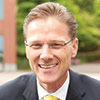President's View Engaging the Culture, Changing the World
A Necessary Conversation
Following the Great Reconciler toward a Christian vision of diversity
By President Daniel J. Martin | Photo by Luke Rutan
 “Because students will define what’s most important for the rest of their life, we believe there’s great value in a learning experience that takes place both in and out of the
classroom,” says President Dan Martin.
“Because students will define what’s most important for the rest of their life, we believe there’s great value in a learning experience that takes place both in and out of the
classroom,” says President Dan Martin.
Editor’s Note: The following is an adapted version of President Martin’s message to the University community following the February board meeting. Read more about related SPU campus events and work at SPU's Diversity website.
Like many of you, I have been following the protests, debates, and discussions around issues of race and justice at many other colleges and universities. These reports have left me alternately saddened and encouraged. Saddened, because it is evident racial division continues to persist in our country, resulting in many traditionally underrepresented student populations feeling unwelcome and unsafe on college campuses. Encouraged, however, because these concerns are being clearly brought to light in ways that compel our collective attention.
I am also well aware that these concerns do not just exist “out there.” Although I am proud of Seattle Pacific University’s long-standing commitment to reconciliation in general, and to racial and ethnic reconciliation in particular, I know there is more we can do. I’m hopeful that together we can continue to listen, dialogue, and take action in order to continue to make significant progress in this vitally important area on our campus.
In late November I invited our students to an open forum, held on January 14, 2016, to discuss our campus climate and their experiences related to racial diversity, equity, and inclusion. We heard students share their anger, hurt, frustration, and instances where they have felt marginalized and encountered a lack of cultural awareness — instances blunting their sense of belonging.
Following that, we held a forum for faculty and staff, on February 2, 2016, where similar instances and experiences were expressed by colleagues. As I have reflected on what we have heard in the forums to date, it has been challenging on many levels. First and foremost, the negative experiences that were shared do not reflect our Christian identity. This must be our starting point and foundation.
Dr. John Perkins, the civil rights leader, reinforced this thought in a 2009 Winter Response issue, where he said:
“An understanding of the biblical mandate for reconciliation should begin with Jesus Christ. Without his suffering and subsequent victory over pain and death, there would be no reconciliation of God to humanity. Christ’s agony was far beyond our comprehension, and yet without it, we would still be separated from God. We are called to enter into Christ’s pain by taking up our own cross and following the Great Reconciler.”
We are to be a community where “all the members of the body, though many, are one body” (I Corinthians 12:12).
The very nature and person of Christ, his teaching and exemplary life as God’s son, and his death and resurrection provide for us the possibility of living as a community where God has “torn the veil” by removing all divisions. In addition, the Holy Spirit, as revealed through the Holy Scripture, instructs us as to the value and prioritization of embracing, fostering, and living into the call to be reconcilers, transcending differences and appreciating and respecting each person’s humanity and uniqueness in the image of God, thereby reflecting the Kingdom of God.
“Any aspect of racial bias or exclusiveness is a breakdown in the community we are called to be.”
Therefore, any aspect of racial bias or exclusiveness is a breakdown in the community we are called to be. Our own Free Methodist tradition, with its founding mission and consistent proclamation of class, race, and gender inclusion, is a direct contributor to our University’s identity and prospect of the practices of reconciliation.
But, we live in this time as it relates to the Kingdom of God, defined as the “already, but not yet”; implemented in part by us, here and now. It is the very concept that we each have a role in implementing the Kingdom of God that has personally compelled me to pray, reflect, listen, read, consult with experts, and reorient my own life to more fully engage in intercultural relationship opportunities — all helping to shape my understanding of the various gaps and barriers to fully being a community where all people can flourish.
Some of the most informative and formative conversations I have had since the academic year began have been with various student groups that have recently formed. One group, “Students for Change,” desired we host a second all-campus forum. Thus, we worked collaboratively with this group of students to design and promote another forum held Tuesday, March 1. Now, I believe we can extend beyond forums and conversations, by identifying specific strategies and actions for us to pursue. I sense the urgency, and am motivated to fulfill our commitment to our students and their future — responding to the very call of Christ on our lives — corporately and individually.
I commit to keeping the Seattle Pacific community regularly informed of progress and results. It is my hope that SPU is known, not just for its robust conversation on the most important topics of the day, but also as a place noted for its respect of and love for one another. I’m looking forward to working with our community to this end.
 Dan Martin is SPU’s 10th president. Learn more about him at spu.edu/president.
Dan Martin is SPU’s 10th president. Learn more about him at spu.edu/president.
